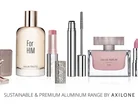Axilone & Aludium Partner to Reshape Cosmetic Packaging

Axilone, a global leader in luxury cosmetic packaging, has joined forces with Aludium, a leading European aluminium supplier, to launch a groundbreaking low-carbon aluminium solution. The partnership is set to redefine the future of sustainable packaging in the cosmetics industry, responding to Category 1 - purchased goods and services of its Scope 3 emissions.
Aludium, renowned for its expertise in producing high-quality aluminium products, has made significant investments in sustainable practices. By leveraging its advanced technology and processes, it is able to produce aluminium with a reduced carbon footprint.
For Axilone, sustainability has become a critical focus, as luxury brands increasingly seek packaging solutions that align with emission targets. By collaborating with Aludium, Axilone offers its clients packaging that not only maintains the premium feel and aesthetic expected in the luxury sector but reduces carbon emissions.
Introducing low-carbon aluminium into cosmetic packaging is a significant step forward for both companies. It highlights the importance of collaboration in addressing the challenges especially in industries like cosmetics where packaging plays a key role in brand identity.
A Significant leap Towards sustainability
The new aluminium offering, known as ECO P7 Aluminium, boasts impressive environmental credentials:
- Over 24% decrease in carbon emissions compared to the European average for primary aluminium.
- A staggering 76% reduction when measured against primary aluminium produced in China.
- Less than 7 tonnes of CO2 equivalent generated per tonne of aluminium, from raw material extraction to delivery.
Rigorous certification for transparency
To ensure credibility, the greenhouse gas emissions of ECO P7 Aluminium are:
- Verified by an independent third party.
- Certified in accordance with ISO-14067-1:2018 and the Greenhouse Gas Protocol Standards.
The meticulous certification process provides full transparency of the aluminium's carbon footprint, giving brands and consumers confidence in its environmental claims.
Martin Haye, Strategic & Development Director at Axilone Group, emphasises the company's commitment to sustainability:
"We see it as our responsibility to identify more environmentally friendly aluminium and continuously work to optimise the life cycle of our packaging. This is why we are committed to introducing more sustainable materials to the market, with lower CO2 emissions."
Michael Brandner, Specialties Sales Director at Aludium, adds:
"Thanks to substantial investments in Aludium's assets, technology, and processes, we are helping customers and end users meet their carbon reduction goals."
The future of cosmetic packaging
The collaboration between Axilone and Aludium represents a significant step forward in the beauty industry's efforts to reduce its environmental impact. By offering a low-carbon aluminium option for cosmetic packaging, these companies are paving the way for more sustainable practices in the luxury beauty sector.
"Thanks to substantial investments in Aludium's assets, technology, and processes, we are helping customers and end users meet their carbon reduction goals."
The introduction of this low-carbon aluminium solution not only addresses the growing demand for sustainable beauty products but also has the potential to transform industry practices. As more companies adopt similar approaches, the cumulative effect could lead to a substantial reduction in the cosmetic industry's overall environmental footprint, ushering in a new era of eco-friendly beauty packaging.
- Maersk Sustainability Reporting: Navigating Scope 3Transportation & Logistics
- SHEIN’s Scope 3 Emissions: Fast Fashion’s Carbon BurdenCircular Economy
- Tackling Super Bowl LIX's Scope 3 Emissions ChallengeScope 1 2 and 3
- NetApp’s SBTi Validation Marks Sustainability MilestoneScope 1 2 and 3
Featured Articles
Estonia, Latvia and Lithuania join the European grid, cutting ties with Russian energy, a move that boosts regional security and sustainability
TÜV SÜD: New battery regulations bring Scope 3 hurdles, requiring sustainable sourcing, digital traceability and design changes increasing compliance
Nissan is scaling up its use of green steel, reducing CO2 emissions in its supply chain as part of its goal to achieve carbon neutrality by 2050

